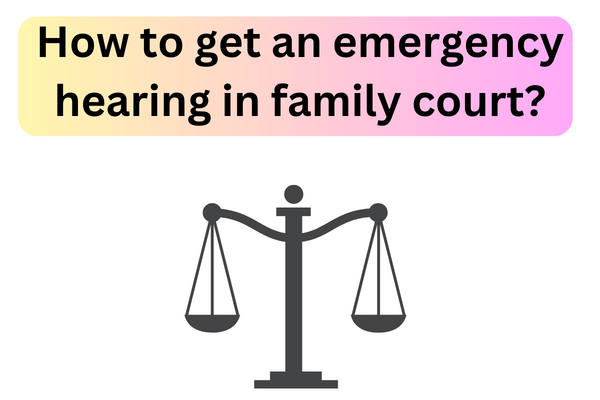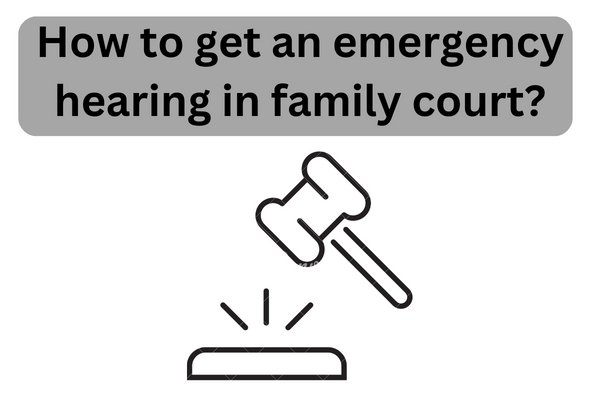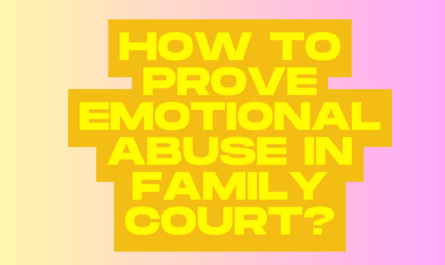How to Get an Emergency Hearing in Family Court?
In family court, certain situations demand immediate attention due to their urgent nature. These circumstances may include domestic violence, child custody disputes, or issues related to child support. When facing such critical situations, individuals have the option to request an emergency hearing in family court. In this comprehensive guide, we will explore the process of obtaining an emergency hearing, the essential requirements, and useful tips for success.
How to Get an Emergency Hearing in Family Court?
When seeking an emergency hearing in family court, there are several crucial steps to follow. Let’s take a closer look at each one:
Step 1: Consult with an Attorney
The first and most important step in obtaining an emergency hearing is to consult with a family law attorney. An experienced attorney will provide invaluable guidance and ensure that you have a solid case for requesting an emergency hearing.
Step 2: Gather Evidence
To support your request for an emergency hearing, it is essential to gather all relevant evidence. This evidence may include police reports, medical records, photographs, or any documentation related to the urgent situation.
Step 3: File the Motion
Your attorney will help you prepare and file a motion with the family court. The motion should clearly state the reasons for requesting an emergency hearing and the evidence supporting your claims.
Step 4: Serve Notice
Once the motion is filed, you must serve notice to all parties involved in the case. This includes the opposing party or their attorney. Properly serving notice is critical to ensuring that the court proceedings are fair and just.
Step 5: Attend the Hearing
On the scheduled date, attend the emergency hearing with your attorney. Be prepared to present your case and provide the evidence that justifies the need for immediate court intervention.
Step 6: Await the Court’s Decision
After the hearing, the judge will evaluate the presented evidence and make a decision. If the court grants your request for an emergency hearing, the case will be expedited to address the urgent matter promptly.
Tips for a Successful Emergency Hearing
Tip 1: Act Promptly
In emergency situations, time is of the essence. Act promptly to consult with an attorney and file the necessary motion. Delaying the process may negatively impact the court’s decision.
Tip 2: Be Prepared
Thoroughly prepare for the emergency hearing with the help of your attorney. Ensure that all evidence is organized and ready for presentation.
Tip 3: Stay Calm and Composed
During the hearing, remain calm and composed while presenting your case. Clear communication and a composed demeanor can positively influence the judge’s decision.
Tip 4: Be Honest and Truthful
Honesty is crucial in any legal proceeding. Be truthful when presenting your case and avoid exaggeration or fabrication of facts.
Tip 5: Follow Court Orders
If the court grants your request for an emergency hearing and makes specific orders, it is essential to follow them diligently. Failure to comply with court orders may have serious consequences.
FAQs:
FAQs 1:What are the Grounds for an Emergency Hearing in Family Court?
In family court, grounds for an emergency hearing may include situations involving domestic violence, child abuse, or immediate threats to a child’s safety and well-being.
FAQs 2: Can I Request an Emergency Hearing Without an Attorney?
While it is possible to request an emergency hearing without an attorney, it is highly recommended to seek legal counsel for the best chances of success.
FAQs 3: How Long Does It Take to Get an Emergency Hearing?
The timeline for obtaining an emergency hearing can vary based on the court’s schedule and the urgency of the situation. In some cases, hearings may be scheduled within a few days.
FAQs 4: What Happens if the Court Denies My Request for an Emergency Hearing?
If the court denies your request for an emergency hearing, the case will follow the regular court process, which may take longer to reach a resolution.
FAQs 5: Can I Appeal the Court’s Decision on an Emergency Hearing?
Yes, you can appeal the court’s decision if you believe there was an error or a miscarriage of justice during the emergency hearing.
FAQs 6: Is an Emergency Hearing the Same as a Temporary Order?
No, an emergency hearing and a temporary order are different. An emergency hearing addresses immediate and urgent matters, while a temporary order is a short-term court order issued during ongoing legal proceedings.
Conclusion
Obtaining an emergency hearing in family court is a process that demands careful preparation and adherence to legal procedures. By following the outlined steps and seeking professional guidance, individuals can present their cases effectively and seek timely resolution for urgent family matters. Remember to act promptly, gather compelling evidence, and remain honest and composed during the hearing. An emergency hearing can be a powerful tool to safeguard the well-being of your loved ones and address critical family issues efficiently.
Visit the link to read more: https://family-fitness-fun.com/how-to-divide-assets-in-a-blended-family/





